Related Research Articles

The Sri Lankan civil war was a civil war fought in Sri Lanka from 1983 to 2009. Beginning on 23 July 1983, it was an intermittent insurgency against the government by the Liberation Tigers of Tamil Eelam led by Velupillai Prabhakaran. The LTTE fought to create an independent Tamil state called Tamil Eelam in the north-east of the island, due to the continuous discrimination and violent persecution against Sri Lankan Tamils by the Sinhalese-dominated Sri Lanka government.

Indian Peace Keeping Force (IPKF) was the Indian military contingent performing a peacekeeping operation in Sri Lanka between 1987 and 1990. It was formed under the mandate of the 1987 Indo-Sri Lankan Accord that aimed to end the Sri Lankan Civil War between Sri Lankan Tamil militant groups such as the Liberation Tigers of Tamil Eelam (LTTE) and the Sri Lankan military.
Ilayathamby Tharsini was a minority Sri Lankan Tamil woman who was raped and killed in her home town of Pungudutheevu on December 16, 2005.
Krishanti Kumaraswamy, also spelled Krishanthi Kumaraswamy, was a Tamil woman in Sri Lanka who was raped and murdered on 7 September 1996 by six Sri Lankan Army soldiers; the effort to bring her assailants to justice became a cause célèbre as a part of the protest against atrocities committed by the Sri Lankan Army during the Sri Lankan Civil War.
Human rights in Sri Lanka provides for fundamental rights in the country. The Sri Lanka Constitution states that every person is entitled to freedom of thought, conscience and religion, including the freedom to have or to adopt a religion or belief of his choice. And, that every person is equal before the law.
The Navaly Church bombing refers to the bombing of the Church of Saint Peter and Saint Paul in Navaly in the Jaffna Peninsula by the Sri Lankan Air Force during the Sri Lankan Civil War on 9 July 1995. It is estimated that at least 147 Tamil civilians, who had taken refuge from the fighting inside the church, died as a result of this incident. The victims included men, women and children.
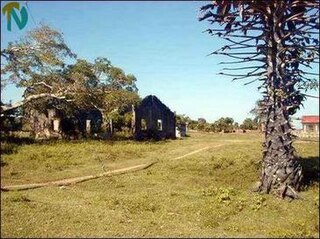
Kumarapuram massacre also known as 1996 Trincomalee massacre or 1996 Killiveddy massacre refers to the murder of 26 Sri Lankan Tamil civilians by the Sri Lankan Army soldiers on February 11, 1996. The victims included 13 women and 9 children below the age of 12. Further 28 civilians were severely injured as well. The event took place in a village called Kumarapuram, located in the eastern district of Trincomalee. It was a notable mass murder of civilians since the resumption of armed conflict between rebel forces and Sri Lankan armed forces since April 1995, as part of the Sri Lankan civil war. The then-government arrested a number of soldiers and home guards who allegedly carried out the massacre. A court case was started on 2004. On 27 July 2016 the court acquitted six former army Corporals who were accused over the massacre, after they were found not guilty.
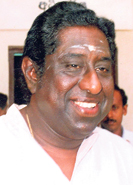
Gaasinather Gangaser Ponnambalam was a Sri Lankan lawyer and politician. Leader of the All Ceylon Tamil Congress, he was the party's presidential candidate in 1982. He was shot dead on 5 January 2000 in an assassination many suspect to be ordered by President Chandrika Kumaratunga.

Thiruchchelvam Nihal Jim Brown was a minority Sri Lankan Tamil, Roman Catholic parish priest who disappeared during the Sri Lankan civil war. He was active helping his parishioners during the bombing of his church in northern Sri Lanka. He went missing with Wenceslaus Vinces Vimalathas on August 20, 2006, and is presumed dead.
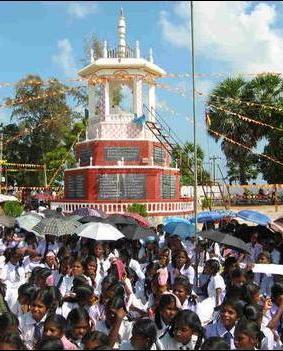
On June 12, 1991, 152 minority Sri Lankan Tamil civilians were massacred by members of the Sri Lankan military in the village Kokkadichcholai near the eastern province town of Batticaloa. The Sri Lankan government instituted a presidential commission to investigate the massacre. The commission found the commanding officer negligent in controlling his troops and recommended that he be removed from office, and identified nineteen other members of the Sri Lankan military to be responsible for mass murder. In a military tribunal that followed in the presidential commission in the capital city of Colombo, all nineteen soldiers were acquitted.
Ida Carmelitta or Farheen Ida Carmelitta Laila Figerardo was a minority Sri Lankan Tamil woman who was gang raped and killed on 12 July 1999 and became a cause célèbre of the Sri Lankan civil war.
Eelam War I is the name given to the initial phase of the armed conflict between the government of Sri Lanka and the LTTE.

Eelam War II is the name given to the second phase of armed conflict between Sri Lankan military and the separatist Liberation Tigers of Tamil Eelam. The war started after the failure of peace talks between the Premadasa government and the LTTE. This phase of the war was initiated by the LTTE who massacred almost 600 Sinhalese and Muslim police personnel after they were ordered by the Premadasa government to surrender to the LTTE. The truce was broken on June 10, 1990, when the LTTE in October expelled all the 28,000 Muslims residing in Jaffna.

Sarathambal Saravanbavananthatkurukal or better known as Sarathambal was a minority Sri Lankan Tamil woman who was gang raped and killed on 28 December 1999. This became an internationally known incident of the Sri Lankan Civil War.
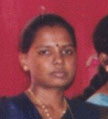
Premini Thanuskodi was a minority Sri Lankan Tamil women who was working as a Chief Accountant for Tamils Rehabilitation Organisation (TRO), a legally registered charity in Sri Lanka, when she was kidnapped on 30 June 2006 and was later raped and murdered. She was 25 years old. Premini was also an undergraduate at the Eastern university at Vantharumoolai.
Wijikala Nanthan and Sivamani Sinnathamby Weerakon are Sri Lankan Tamil women who were allegedly raped and tortured on March 19, 2001, in Mannar, Sri Lanka.

Sri Lanka's Killing Fields is an investigatory documentary about the final weeks of the Sri Lankan Civil War broadcast by the British TV station Channel 4 on 14 June 2011. Described as one of the most graphic documentaries in British TV history, the documentary featured amateur video from the conflict zone filmed by civilians and Sri Lankan soldiers which depicted "horrific war crimes".
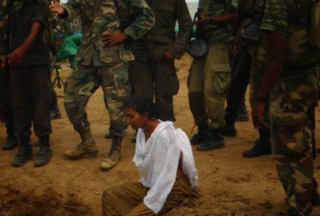
Shoba, also known as Shobana Dharmaraja, was a Sri Lankan Tamil journalist and television broadcaster for the rebel Liberation Tigers of Tamil Eelam (LTTE). She died in the final days of the Sri Lankan Civil War in 2009 with video evidence that she was captured by the Sri Lankan military before being raped, tortured and murdered. A senior United Nations official deemed the footage to be authentic. Amnesty International and Human Rights Watch also verified that it was her.
Sexual violence against Tamils in Sri Lanka has occurred repeatedly during the island's long ethnic conflict. The first instances of rape of Tamil women by Sinhalese mobs were documented during the 1958 anti-Tamil pogrom. This continued in the 1960s with the deployment of the Sri Lankan Army in Jaffna, who were reported to have molested and occasionally raped Tamil women.
On December 18, 1999, the 5th President of Sri Lanka, Chandrika Bandaranaike Kumaratunga, was wounded in a coordinated bomb blast that was attempting to take her life. Kumaratunga had been president for one-term, and was campaigning for her second term in office in the 1999 presidential election. Upon leaving her final election rally at Town Hall in the country's capital of Colombo, she was caught in an explosive attack planned by the Liberation Tigers of Tamil Eelam.
References
- ↑ "AI report 1998 : Sri Lanka". Amnesty International. 2007-05-27.
- ↑ "HRW report 1998 : Sri Lanka". HRW . 2007-05-27.
- ↑ Cat's Eye (July 11, 2001). "Checkpoint Rape". The Island.
- 1 2 3 4 "Human rights: big talk, little action". Sunday Times. 2007-02-22.
- 1 2 "Sri Lankan Military Continues to use Rape as a Weapon of Terror". South Asian Media Services. 2007-05-27.
- ↑ "Rebels blow up Sri Lankan bus". CNN . 2007-02-22.
- ↑ How enabled ... ? [usurped]
- ↑ "UNHCHR Report :Sri Lanka". UNHCHR. 2007-05-27.